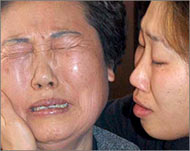Iraq deployment: Seoul, Tokyo to go ahead
Japan and South Korea have voiced determination to proceed with plans to send troops to Iraq despite the death of their nationals in the war-torn country and popular doubts about taking part in the occupation.

The participation of the two Asian nations marks an important step for the US-led occupation’s attempts to persuade other countries to send forces to Iraq.
Two Japanese diplomats were killed in an ambush on Saturday in the northern town of Tikrit. Two South Korean electrical workers also died in a shooting near the same area.
But Japanese Prime Minister Junichiro Koizumi said on Monday there was no change in Tokyo’s stance.
Seoul’s Foreign Minister Yoon Young-kwan also said they would go ahead with troop deployment plans despite the shooting of four South Korean civilians.
He said it was not clear whether the South Korean victims had been specifically targeted because of Seoul’s support for the US-led occupation of Iraq.
Public discontent
But many South Koreans disagree with sending more troops, and opposition has grown since the latest spate of attacks.
 |
|
The wife of the South Korean |
In Japan, a poll published on Monday showed most Japanese were opposed to sending troops, at least until security improves.
Tokyo has passed a law to allow troops to be sent to Iraq, but because of the pacifist constitution they can only be sent to “non-combat zones” for reconstruction and humanitarian work.
The cabinet was expected to approve a basic plan for the dispatch of about 500 Japanese non-combat ground troops as early as Friday.
South Korea’s Roh has committed to send more troops to Iraq to join 675 medical and engineering troops, but faces a tough decision on whether to include combat forces in the larger group.
Prime Minister Goh Kun said last week the contingent could be 3000 troops and was unlikely to be just non-combat.